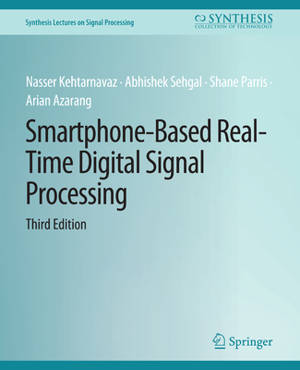
- Retrait gratuit dans votre magasin Club
- 7.000.000 titres dans notre catalogue
- Payer en toute sécurité
- Toujours un magasin près de chez vous
- Retrait gratuit dans votre magasin Club
- 7.000.0000 titres dans notre catalogue
- Payer en toute sécurité
- Toujours un magasin près de chez vous
Smartphone-Based Real-Time Digital Signal Processing, Third Edition
Abhishek Sehgal, Shane Parris, Arian Azarang, Nasser Kehtarnavaz
58,45 €
+ 116 points
Description
Real-time or applied digital signal processing courses are offered as follow-ups to conventional or theory-oriented digital signal processing courses in many engineering programs for the purpose of teaching students the technical know-how for putting signal processing algorithms or theory into practical use. These courses normally involve access to a teaching laboratory that is equipped with hardware boards, in particular DSP boards, together with their supporting software. A number of textbooks have been written discussing how to achieve real-time implementation on these hardware boards. This book discusses how to use smartphones as hardware boards for real-time implementation of signal processing algorithms, thus providing an alternative to the hardware boards that are used in signal processing laboratory courses. The fact that mobile devices, in particular smartphones, have become powerful processing platforms led to the development of this book to enable students to use their own smartphones to run signal processing algorithms in real-time considering that these days nearly all students possess smartphones. Changing the hardware platforms that are currently used in applied or real-time signal processing courses to smartphones creates a truly flexible laboratory experience or environment for students. In addition, it relieves the cost burden associated with using dedicated signal processing boards noting that the software development tools for smartphones are free of charge and are well-maintained by smartphone manufacturers. This book is written in such a way that it can be used as a textbook for real-time or applied digital signal processing courses offered at many universities. Ten lab experiments that are commonly encountered in such courses are covered in the book. It is written primarily for those who are already familiar with signal processing concepts and are interested in their real-time and practical aspects. Similar to existing real-time courses, knowledge of C programming is assumed. This book can also be used as a self-study guide for those who wish to become familiar with signal processing app development on either Android or iOS smartphones/tablets.
Spécifications
Parties prenantes
- Auteur(s) :
- Editeur:
Contenu
- Nombre de pages :
- 160
- Langue:
- Anglais
- Collection :
Caractéristiques
- EAN:
- 9783031014154
- Date de parution :
- 31-08-20
- Format:
- Livre broché
- Format numérique:
- Trade paperback (VS)
- Dimensions :
- 191 mm x 235 mm
- Poids :
- 343 g

Les avis
Nous publions uniquement les avis qui respectent les conditions requises. Consultez nos conditions pour les avis.






